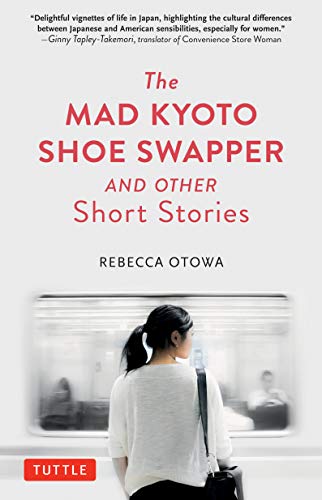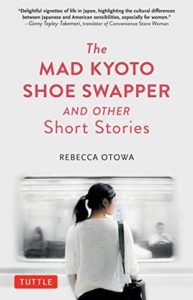
The Mad Kyoto Shoe Swapper and Other Short Stories by Rebecca Otowa (Tuttle Publishing, March 2020)
Reviewed by Renae Lucas-Hall
This collection of fifteen short stories provides a delightful portrayal of urban and rural life in Japan of the past and present. Rebecca Otowa shows remarkable talent as she glides through a series of eclectic writing styles. Central themes include fate, despair, morality, prosperity and decline, frustration and acceptance, adjustment and change, love and loss, cultural adversity, and misunderstanding.
The writer has taken on the tricky method of switching to different time periods to show maturity, growth or decline. She does this seamlessly; we see all sorts of characters evolve, or not, and their health and lifestyles prosper or fall by the wayside as the years pass.
“Genbei’s Curse” is a harrowing piece particularly poignant in these uncertain times due to COVID-19. If karma is considered, readers may worry about becoming a victim themselves if they’re unsympathetic towards others.
Readers who relish Japanese history or love a good old-fashioned fight with fire and axes will be on the edge of their seat reading “Trial by Fire.” But it was “Showa Girl” that really appealed to me. The story drops the reader straight into pre-war Japan and the Manchurian crisis while following a young girl who carries out her every day chores, attends school, and confronts soldiers during the Showa period (1926-1989).
“The Turtle Stone” addresses traditions and the ingrained value and respect attributed to customer service in accordance with the Japanese phrase okyakusama wa kamisama desu (the customer is god). The story describes how cultural heritage is passed down from one generation to the next and how modernity is eroding a long list of Japanese treasures, crafts and skills while dementia also plays its part impacting humankind.
The title story is the last anecdote in the volume. “The Mad Shoe Swapper” is a comical piece based on the author’s personal experiences but is best understood realizing how strict Japan can be. There are rules everyone abides, and Westerners are expected to follow, like the removal of shoes at the entrance to a home or at certain temples. In “The Mad Kyoto Shoe Swapper” a young man flouts the laws of propriety and steps into other people’s shoes at temples on his way out, leaving his own pair behind. This little game of theft becomes an obsession. The writing is thoroughly entertaining and there’s an unexpected happy ending.
The Mad Kyoto Shoe Swapper and Other Stories is packed with interesting stories with appealing characters. The writing is passionate, the endings unexpected. I sense Otowa’s liberation via her prose, and I hope we can look forward to more of her anecdotes that unearth even deeper insights into Japan.
Read an excerpt of the book here.
About the Reviewer
Renae Lucas-Hall is an Australian-born British novelist and writer at Cherry Blossom Stories. She completed a B.A. in Japanese language and culture at Monash University and an Advanced Diploma in Business Marketing at RMIT University. She is the author of Tokyo Hearts: A Japanese Love Story (2012, ranked number one in Coming of Age books on Amazon Japan) and Tokyo Tales: A Collection of Japanese Short Stories (2014). Connect with Renae on Twitter, Instagram and Facebook. Visit her website cherryblossomstories.com.
